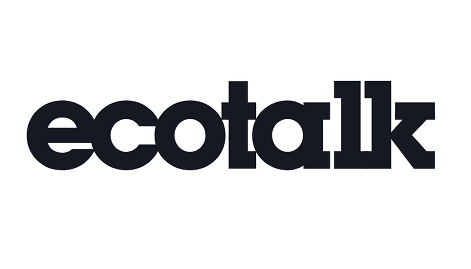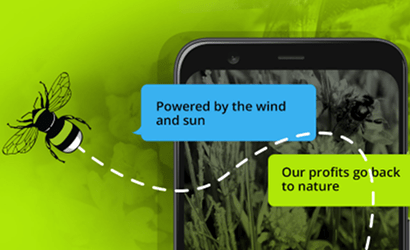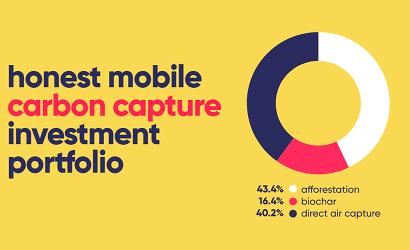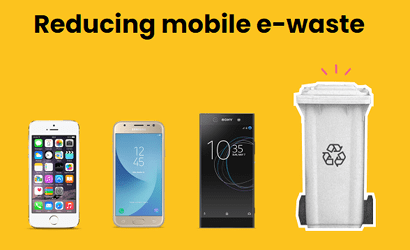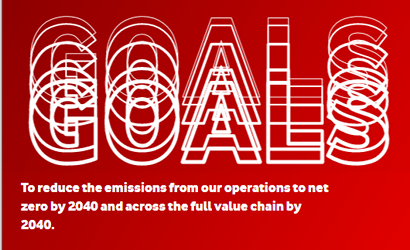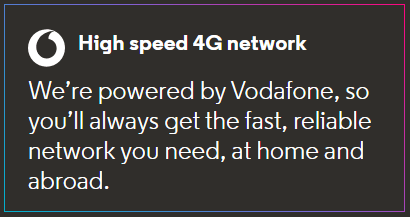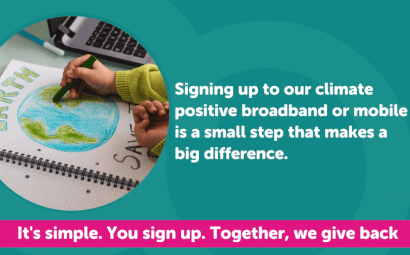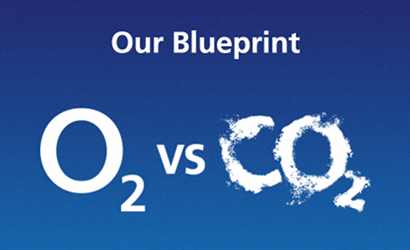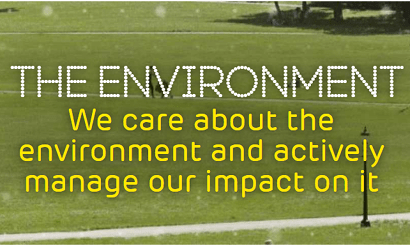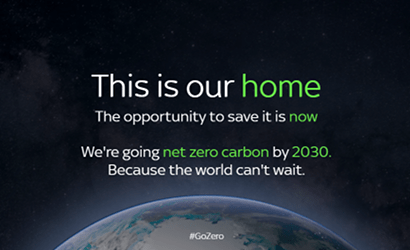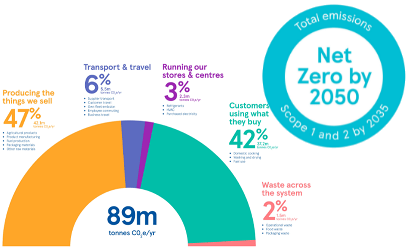Sustainable mobile networks: UK's most environmentally friendly

The retailers featured on this page may compensate us when our readers follow links to their websites and make a purchase. More
We check the green credentials of every mobile provider in the UK to find out what they're doing on carbon emissions, biodiversity and more. Last updated: 18th August 2025.
How the networks compare
1st: Ecotalk are a fully green network that focus on rewilding
Ecotalk are the best network for environmentally conscious buyers in our eyes. They power their network with green energy sources like wind and sun and dedicate themselves to rebuilding the country’s ecosystems.
They have lots of case studies of parts of the country they’ve rebuilt to help Britain’s wildlife thrive. They take a wider approach to protecting the environment rather than just focusing on emissions.
And the fact that they use the EE network with leading coverage and data speeds means you don’t get a worse network experience for your principles (check their network near you).
The only weak point is that they haven’t said anything about how they reduce plastic waste such as using recyclable SIMs. But Ecotalk do more than any other provider to help you improve your environmental impact.
Useful link: See Ecotalk’s SIM only plans
2nd: Honest Mobile are the only carbon negative provider
Honest Mobile are the first and only carbon negative UK network. They primarily do this through Direct Air Capture where carbon dioxide is taken out of the air and turned into stone by machines.
And they also use Biochar that turns CO2 producing organic waste into charcoal that traps CO2. With all this, Honest confidently claim to remove twice the amount of CO2 from the air that being on your plan produces.
Most of their positive impact comes from using their profits to plant trees. And Honest are also a BCorp mobile provider, meaning they’re dedicated towards improving their environmental impact.
Honest also use recycled SIMs and offer eSIMs as a way to reduce physical plastic waste. They don’t quite have the holistic approach that Ecotalk do, but they still do a lot to help the environment.
Useful link: See Honest Mobile’s environmental pledges
3rd: giffgaff are now a certified BCorp provider
giffgaff have joined Honest Mobile by becoming a certified BCorp provider. This means they’re dedicated to improving their environmental impact and they’ve been going about this in a few different ways.
They use fully recycled and recyclable SIMs and use more sustainable options to run their business. This includes things like running their offices with 91% renewable energy (from 2023) and reducing water wastage.
giffgaff also help customers in recycling their old phones and devices. They’ll make sure your phone is properly and sustainably recycled, which gives you some peace of mind when getting rid of your old devices.
And you can also join on an eSIM to reduce any waste when joining them. The main downside is that they use O2’s network who missed their commitment to being net zero this year, otherwise they’re a decent choice.
Useful link: Read giffgaff’s impact report on their website
Joint 4th: Vodafone do a lot to reduce their emissions
Running a mobile network has an unavoidable environmental cost, but Vodafone are doing more than most UK providers to reduce their long-term impact.
They’ve changed their net zero goal from 2030 to 2028 and claim to have reduced emissions by 84% since 2020. While they’re not quite there yet, it shows a clear dedication to cleaning up their environmental impact.
To do this they run their UK offices on 100% renewable electricity now 100% of their total energy usage comes from renewable sources. They’ve also done a lot to reduce plastic waste, such as with their Eco-SIMs.
They did say they’d be entirely plastic free by 2025, but the fact they’ve been silent on this suggests they haven’t quite achieved this. They also offer eSIMs, but otherwise there’s still room for improvement.
Useful link: Vodafone’s environmental pledges
Joint 4th: VOXI benefit from Vodafone’s improvements
VOXI don’t promote environmental initiatives heavily on their own site, but that’s because they’re a sub-brand of Vodafone. As such, they benefit directly from Vodafone’s wider environmental commitments.
This means VOXI are covered by Vodafone’s pledge to reach net zero emissions by 2028. VOXI’s fairly minimal digital environmental impact is powered using 100% renewable electricity.
VOXI have taken a few steps of their own. They sell refurbished phones as a lower-cost option for customers. While this mostly fits their budget-conscious market, it reduces the number of new devices in circulation.
We’re also pretty sure VOXI use the same recyclable Eco-SIMs as Vodafone as they’re basically the same company. But they haven’t confirmed this. However, they donate a lot to the Cool Earth charity and offer eSIMs.
Useful link: Vodafone’s guide to their Eco-SIMs
5th: Co-op Mobile do a lot to reduce carbon emissions
Co-op Mobile might be a smaller mobile provider, but they’ve built a strong environmental message around their services. A key part of their approach is reducing the environmental impact of each of their customers.
They claim to reduce each customer’s carbon footprint by 6kg every month. This is part of their partnership with Ecologi, which helps fund global reforestation and clean energy projects.
They claim to have planted over 200,000 trees on behalf of their customers. And their claims of being ahead of their 2040 goal for net-zero is good, but they haven’t published much specific information about this.
Co-Op have also introduced eSIMs, but haven’t made any other clear moves to reduce plastic waste in their operations. For a smaller network they’re doing a respectable job, but there’s still room to improve.
Useful link: Co-op's partnership with Ecologi
6th: O2 have made progress on carbon, but not plastic waste
O2 are another one of the UK’s major mobile networks working to reduce their environmental impact. They have done a bit by ensuring they are powered by 100% entirely renewable energy.
But they did miss out on their net zero target this year and now claim they will be net zero by 2040. That’s a big delay, but they do have some ambitious targets to reduce emissions across their operation soon.
Their O2 Recycle programme also helps reduce e-waste. You can send them old or damaged phones and get cash back for it. So far the scheme has helped prevent 3.3 million devices from going to landfill.
But unlike some other networks, they haven’t introduced eco-SIMs or made broader commitments to reduce or reuse plastic across their operations. They do offer eSIMs, but there’s room to improve here.
Useful link: See O2’s environmental pledges
7th: EE also do a good amount to reduce their impact
The next best main network for reducing environmental damage caused by their operations are EE. And their network is entirely powered by 100% renewable energy.
They’ve also introduced eSIMs, which helps reduce plastic waste. They also claim that no waste has been sent to the landfill from their offices, but haven’t said much about their plans to reduce plastic waste.
EE also missed their net-zero target this year and haven’t made any new predictions, other than planning to meet the government’s 2050. That’s a let down and brings them down significantly here.
Finally, EE have made no claims to reduce Scope 3 emissions like Vodafone have. And they haven’t done quite as much to reduce plastic waste or emissions from their supply chain operations. So in all, they fall short here.
Useful link: EE’s environmental pledges
Joint 8th: Three don’t do as much as other networks
Compared to the other main UK networks, Three seem to be doing the least to address their environmental impact. While they have made some progress, there’s still a long way to go in terms of pledges and transparency.
For a start, Three have not set a target date for becoming net zero or even carbon neutral. They do say they’re reducing emissions, but haven’t published clear milestones or deadlines like Vodafone, EE or O2 have.
They’ve managed to power 97% of their operations using renewable energy, which is behind competitors already running on 100%. And without a net zero goal in place, it’s hard to gauge how committed they really are.
That said, they have taken big steps to recycle office waste and have reduced their plastic usage over time. They’ve also rolled out eSIMs, but other networks are much better for environmentally conscious users.
Useful link: See how you can recycle your old device with Three
Joint 8th: SMARTY’s initiatives are the same as Three’s
SMARTY are owned by Three, so their environmental impact is tied closely to what Three are doing. Any carbon reduction or energy improvements made across the shared network infrastructure will benefit SMARTY too.
Because SMARTY operate entirely online and don’t run retail stores, they already have a smaller environmental footprint than other networks. There’s less office waste and no store-related emissions.
But SMARTY don’t promote any of their own green initiatives. They haven’t introduced eSIMs to reduce plastic SIM use, and there’s no mention of steps to reduce packaging waste or emissions from deliveries.
If minimising your environmental footprint is a priority, there are other networks doing more to offset their impact or reduce waste directly. SMARTY benefit from being lean and online, but they do much else.
Useful link: Read our full review of SMARTY
9th: Sky Mobile use entirely renewable energy
Sky Mobile sit within the larger Sky brand, which has made major environmental commitments. But as a mobile provider on its own, Sky Mobile haven’t taken many visible steps to reduce their environmental impact.
As a brand Sky are already carbon neutral, meaning they offset all the carbon they emit. They also aim to be completely net zero by 2030, covering both direct and indirect emissions across their operations.
The brand runs on 100% renewable electricity and is partnered with WWF and other organisations to help protect nature and promote sustainability. But there’s little on how this translates to Sky Mobile specifically.
They do offer device recycling, which is a positive step. Still, without more direct action or transparency around Sky Mobile’s role, it’s hard to place them higher in our rankings.
Useful link: See all the ways Sky are reducing their impact here
10th: Tesco Mobile don’t do much to reduce their impact
Tesco Mobile sit under the wider Tesco brand, which has committed to a number of environmental targets. But when it comes to Tesco Mobile itself, there’s little information about what they’re doing.
Across the brand there’s been a 65% cut in greenhouse gas emissions for Scope 1 and 2, including mobile operations which are also powered by 100% renewable energy. They aim to reach net zero across these by 2035.
The brand has also taken steps to reduce plastic waste and support net zero deforestation. And Tesco stores offer phone repairs via their in-store mobile desks, which helps keep devices in use longer.
Finally, 100% of their paper is now from sustainable sources. But there’s still no evidence that Tesco Mobile are taking direct, separate action beyond Tesco’s broader goals.
Useful link: Recycle your old device with Tesco Mobile
Joint last: all the other mobile networks





✔ These don’t have specific pledges
These networks either don’t have any environmental strategies or have done little to reduce their environmental impact. iD Mobile do offer a trade-in scheme to recycle your phone, and they’ll even pay you for it.
Talkmobile and others may benefit indirectly from the environmental work of their host networks, such as Vodafone or Three, but there’s nothing to suggest they have sustainability practices of their own.
That isn’t enough to say these providers are offsetting their operations in any significant way. And unlike larger networks, there’s no mention of targets like becoming carbon neutral or cutting plastic waste.
One positive is that these networks tend to be smaller and cheaper, so their overall impact could be lower due to scale. And you can use the money saved to support environmental causes directly if that’s a priority.
Useful link: Compare SIM only deals using our comparison tool
